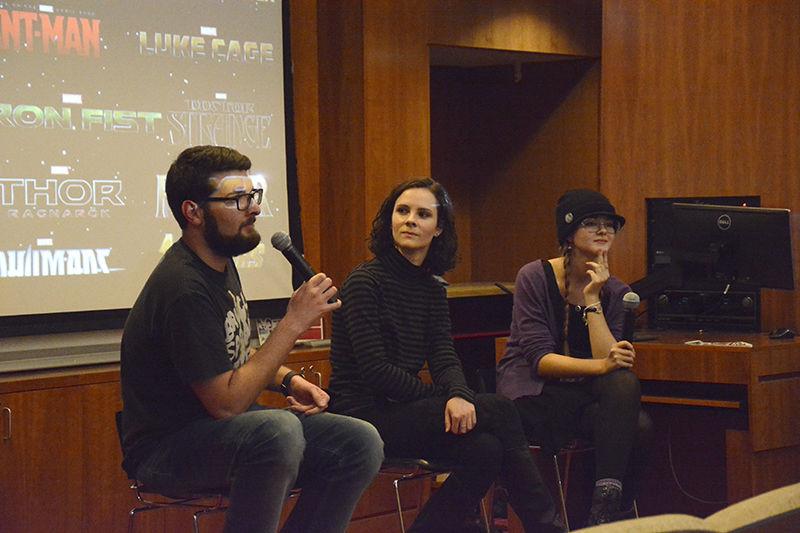Monday night, a panel of NC State students and alumni gathered to discuss current issues and occurrences in the world of comics.
The panel was jointly facilitated by the NCSU Libraries and the University Scholars Program, and moderated by Allen Coates, a senior majoring in film studies. Panelists were Erika Grandstaff, a senior studying anthropology, Peter Wright, a graduate student studying anthropology, and alumna Alexa Eno, who is now furthering her education at Duke. This panel, which took place at D.H. Hill Library, is one of the first to be composed entirely of students and alumni. A small crowd gathered in the upper auditorium, and chattered enthusiastically prior to the beginning of the talk.
One of the first topics put forward by Coates was how to break into the world of comics without a background.
“A lot of people may not like me for saying this,” Wright said with a grin. “I am a total proponent of just looking at Wikipedia. You shouldn’t have to look through 20 years of comics to understand a character.”
All three panelists emphasized the fact that while the traditional superhero comics may not be appealing to all, there are many more varieties of comics than most of the general public realizes.
“If you look hard enough, you’re going to find a comic that you’ll fall in love with,” Wright said.
Eno shared that she personally became interested in comics only last year through a capstone course and emphasized that while she doesn’t fit any of the “comic nerd” stereotypes, she has developed great enthusiasm for comics as both art and literature.
“The past decade has done a lot to make comics accessible to everyone,” Grandstaff said. “The Marvel movie influx has really opened things up.”
The panel spent a good deal of time discussing the pros and cons of the recent onslaught of superhero and comic book-related movies and TV shows in the last few seasons. While all three panelists agreed that bringing the stories and values found in comics to broader audiences is a positive thing, they did have reservations.
“My generally underlying feeling toward upcoming movies is always fear,” Grandstaff said. “How is this going to change the continuities of the character? But normally I come out feeling pretty good about what I saw.”
Wright leaned more toward the opinion that the sheer volume of movies produced, rather than the potential for alteration of characters, is the issue.
“My main concern comes from fatigue for audiences — at some point you’ve got to think maybe people will get tired of this,” Wright said, citing the formulaic nature of many of the origin story films that have been produced in the last few years.
On a related note, the panel also discussed the controversy of “reboots,” in which characters or even entire universes can be stripped of their existing backstories and continuities in order to recreate the story afresh. Grandstaff felt that this phenomenon enables new readers to come in without doing months of research, and also thought that the reboots were positive for the industry, because they enable writers to create new storylines while capitalizing on the name recognition of an established character or character set.
“Rebooting is sort of a necessary evil for the comics industry at this point,” Wright said.
Throughout the discussion, panelists and moderator alike expressed a deep appreciation for and interest in comics that might surprise many. While they acknowledged the geekiness and entertainment value of comics, they also emphasized the potential for moral and personal development that many might scoff at.
“I identified with Spider-Man as a kid,” Grandstaff said. “He was this skinny white nerd who got bullied a lot, but he had super powers. I think a lot of us want to feel that way —we want to feel like we can undergo transformations and become better versions of ourselves.”
In an interview after the discussion, Coates went so far as to say that comics were an important part of his development as an individual, teaching him many of his values and ideals.
Overall, the discussion was interesting and informative, even to a comic outsider, and posed the question of how the medium of comics, which many people consider an important part of their cognitive and moral development, is often relegated to the status of idle entertainment.













